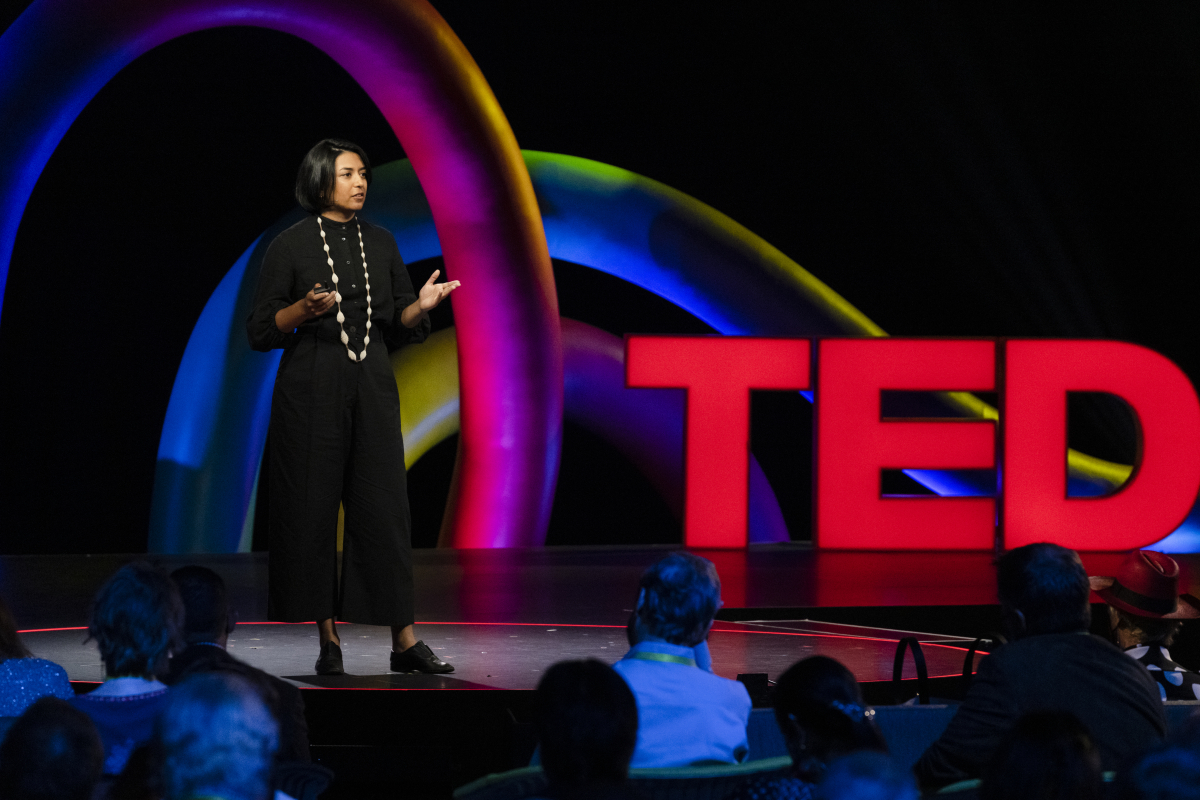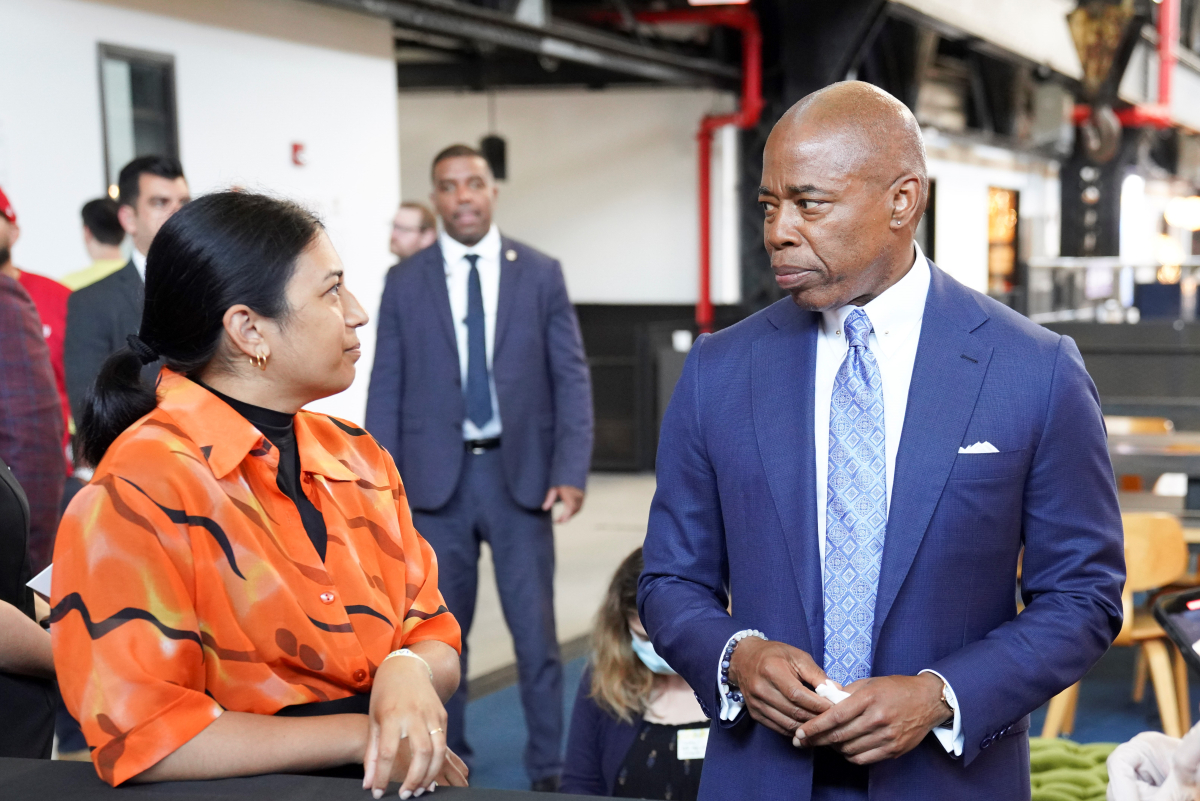Isha Datar looks down at her sweater in an Edmonton coffee shop. The dark vintage pullover has a red logo that’s hard to decipher over Zoom. “I cut the bottom off it,” she says. If you want the right length of crop, “you gotta do it yourself,” she concludes.
Datar, 34, may have just expressed the guiding motto of her life. She spent the last nine years pioneering New Harvest, a donor-funded American non-profit that’s a leading light of the lab-grown meat world. In that time, she became one of the leaders of a new field, even coining the now-ubiquitous term “cellular agriculture” in 2015.
New Harvest is what Alex Smith, a food and agriculture analyst for the Breakthrough Institute, describes as “an ecosystem builder.” The organization connects members of the cellular agriculture community and provides funding for academics doing primary cell ag research — roles that government agencies like the USDA (or Agriculture and Agri-Food Canada) often perform.
“They’re a very central organization in a lot of ways,” Smith says, laying a lot of the credit for that role at Datar’s feet. “She’s both setting the mission and really establishing these high-level goals.”

Ironically, Datar’s fascination with the idea of growing meat in a lab started in Canadian beef country. Alberta boasts almost half of the country’s cattle, and the University of Alberta has a long history with meat research and development. So it’s not very surprising that in 2009, as a bioscience undergrad, Datar happened to take an upper-level course on meat chemistry.
Growing up in Alberta, fossil fuels loomed large, Datar remembers. She had always assumed oil was the biggest driver of climate change. But during the course, “I was just kind of blown away by the impact of these animals (cattle),” she says. Estimates peg the climate change contribution from animal agriculture to at least 31 per cent of total greenhouse gas emissions.
A few weeks later, her professor mentioned the idea of growing animal cells in a vat — something that has long been done by pharmaceutical companies, which use specifically designed cell lines to produce drugs.
Growing edible meat in a bioreactor struck Datar — as it did others in the 2010s — as simply a matter of resolving questions of scale. Her term paper for the course looked at the prospects of cultured meat, and her prof, food scientist Mirko Betti, said it merited a wider audience.
The pair published in the journal Innovative Food Science and Emerging Technologies in January 2010. The paper has been cited in academic literature more than 270 times — for context, a paper with more than 10 citations is considered influential.
“I was a young assistant professor, and I was trying to provoke the class,” says Betti. All his students looked at him like he was nuts, he remembers, when he started talking about lab-grown meat. That is, except for Datar. “Among all the students, she really took me seriously,” he says.
*****
The paper brought Datar serendipitously to New Harvest’s door. The organization was started in 2004 by American national security expert Jason Matheny. But when Datar first saw the group’s website five years later, it was just a single page with a bunch of links. “For him, New Harvest was an evenings and weekends kind of thing,” Datar says.
“For all that, New Harvest had already commissioned some of the first work on cultured meat's potential environmental impact and influenced Google co-founder Sergey Brin to put money into what would become the first cultured meat tasting, in 2013.”
She emailed her paper to the fledgling website’s info address, not knowing who was on the other end. It was Matheny. “He emailed me back, cc’ed half of the researchers I had cited, and suddenly they were doing a peer review of my paper, offering suggestions,” she says.
Soon, Datar found herself in the midst of the budding world of cultured meat. Nobody asked how old she was or assessed her qualifications in the way common to academic circles. “I think that was something that stayed with me for a long time,” she says, “just like this blind enthusiasm for whoever wanted to talk shop about this crazy idea.”
After moving to Toronto, she completed a master’s degree in biotechnology. The program offered at the University of Toronto is essentially a feeder for the pharmaceutical industry. She interned with GlaxoSmithKline, but pharma was never her intent. She was interested in studying the possibilities of vat-grown animal products for food, but the field didn’t exist, her supervisors told her.
She kept in touch with the contacts she made through New Harvest. One of them connected her with TEDxToronto to talk about cultured meat. Around the same time, she interviewed with New Harvest, which had been looking around for its first full-time executive director. Neither thing was a done deal yet, but brimming with confidence, Datar told TEDxToronto that she was going to become the ED of New Harvest. She told New Harvest about the TED Talk.

The talk, still available on YouTube, shows a younger version of the woman on the other end of the Zoom call, with a different hairstyle and a TED-ready attitude, down to the hand gestures. “I’m Isha, and I love to eat meat,” she opens. She started with New Harvest soon after.
Matheny, who begins a new job as the president and CEO of RAND Corporation this month, declined to comment for this story. “He noted that he hasn’t been involved with New Harvest in many years and doesn’t have much to say,” associate director of media relations Leah Polk told Canada’s National Observer via email.
*****
During her first year as executive director, Datar spent a lot of her time developing New Harvest’s Facebook group. “It was just like a lot of networking,” she says. The second year, she realized that cultured meat wasn’t developing swiftly as a field because it lacked cohesion. “What we really need is a centre of gravity for the entire idea,” she remembers thinking.
She set out to make New Harvest that centre. By 2016, the year the organization held its first annual conference in San Francisco, New Harvest had helped found several startups in cellular agriculture and created fellowships to fund academic research in the field.
As a result of these early efforts, Datar is named as a founder of Perfect Day Foods, a company whose vat-grown milk proteins are on the market in the U.S., Singapore and Hong Kong. She is also a founder of The EVERY Company, whose egg proteins are just beginning to reach American consumers.
Both companies rely on gene-edited micro-organisms to make their products. It’s telling that neither make meat, whether in the form of a nugget or patty or in the more rarified form of a lab-grown steak. The field is far off from growing meat products at scale — some days, Datar thinks, 1,000 years off.
“I think the future of cellular agriculture may actually have nothing to do with replacing steak or chicken and may actually be about creating some new form of food that we don’t know we need until climate change makes us need it,” she says.
Datar’s vision for the field of cellular agriculture is an ecosystem, rather than siloed companies making advances alone. Her commitment to this approach led her to give up her equity in Perfect Day and EVERY, turning her stocks over to New Harvest. Cultured meat “is a concept that I think requires radical transparency in order to succeed,” she says.

It also requires money. A lot of money. And while that money is flowing in the private investment sphere, the future of New Harvest is less sure. At the most recent conference in New York in June, Datar appeared onstage to appeal to the founders and funders of cellular agriculture, many who had paid US$600 a ticket to be there. She raised US$1.3 million in an hour.
The pandemic eroded the organization’s finances. It also brought Datar home to Alberta after a five-year stint in New York. She has no plans to return. “I love not having to live in such a hard-to-live place,” she says. “As easy as it is to move your ideas forward, it’s equally hard to, like, get your laundry done.”
In Edmonton, her three-year-old son is surrounded by her and her husband’s families. The couple was able to buy a house. And Datar can turn off for a little bit. “I can’t be that stage-presence person most of the time,” she says.
She’s gotten involved with Canada’s cellular agriculture field, and enjoys having “a little cohort” of believers in her crazy idea in Edmonton. That’s where Lejjy Gafour, CEO of CULT Food Sciences, a cellular agriculture investment firm, also lives. Future Fields, the company he co-founded, is also headquartered there.
New Harvest’s fresh funding will last it a little while. The organization has embarked — in an uncertain market — on a campaign to raise a further US$18.5 million over the next three years.
Whatever happens in the future, it seems clear Datar will write a next chapter for herself. She’s an adviser for Cellular Agriculture Canada and a frequent speaker. She’s also involved, with Gafour, in a new cell ag “network of excellence” that promotes sharing information openly — something that the startup-driven industry has always struggled with. “In Canada, to get things done, you have to kind of prove yourself somewhere else and then come back to get taken seriously,” she says.
As we wrap up our conversation, she asks about my own job search. In that moment, as we make eye contact over cameras, I can see how, exactly, she got where she is — she’s a born connector sitting in the midst of a fledgling industry that will only find a future via connection. “If there’s anything I can do to help, please, like, don’t hesitate to let me know,” she says.






Comments
Suggestion for future stories. Interview the following people on the future of food:
Geoff Lawton https://www.zaytunafarm.com/
Darren Doherty http://www.regrarians.org/
Mark Shepard https://www.forestag.com/pages/mark-shepard
Richard Perkins https://www.ridgedalepermaculture.com/
These are four world renowned experts in regenerative agriculture. Those who work in the field venerate them for their ideas and practices. Growing food while regenerating the ecology. It's win-win.
I like the article. The source cited, though, puts all food at 26% of GHG emissions, so animal agriculture can't be over 30%. The IPCC (https://www.ipcc.ch/site/assets/uploads/2018/02/ar4-wg3-chapter8-1.pdf) puts agriculture at 10-12%. I understand that it's hard to estimate and it depends a lot on what you count (do you, for example, count the GHGs from cutting and burning rainforest to make way for cattle farming?) The IPCC may have updated this. Clearly, we collectively need a much more plant-based diet - as we need to move at almost light speed away from burning fossil fuels.
The way food is grown with fossil fuels, it takes 8 to 10 calories of fossil fuels to produce one calorie of food, whether we're taking maize, soya, wheat, rice, or vegetables like tomatoes that are harvested by machine. Add in tilling the soil and more carbon dioxide is released when the soil is exposed to the sun and air. Perennial crops, livestock on silvopasture, and aquaponics produce the most food with the fewest outside inputs. In these systems waste becomes an input for another element in the system. I do not have any faith in lab grown meat. A plant with proper supports produces for free and animals likewise produce for free (save perhaps vet visits.) The current system of modern agriculture is input intensive and destroys the soil in the process. Regenerative/regrarian/permaculture systems restore the ecology while providing food, fibre, crafting materials, and medicines. It just is not taught as a method to produce food because big agriculture spends a lot of money funding post-secondary education, and other educational sources like farm magazines so farmers do not know about them, or are wary of them because of monied opinions.
It's easy to see cattle feed displacing 4%-carbon's worth of food crops that would otherwise feed people, i.e., necessitating production of the feed-amount's quantity more of the food crops.
Having looked at the nutrient profile of the "fake meat" I personally wouldn't touch it with a 10' pole. But then I always thought that pretending vegies were meat was stupid to begin with (when tofurkey first emerged).
Have these people never heard of bean burgers??? (Any desire for the taste of meat disappears quickly, just as it does with pretty much anything one's become habituated to, and then stops consuming.)
Perhaps one calculation refers to the global situation, and the other to the domestic case?
The byline says "By Kat Eschner | News, Climate Solutions Reporting | July 25th 2022"
So, presumably this article highlights a "climate solution"; yet, as stated in the article, "The field is far off from growing meat products at scale". So, in what sense does this biotech represent a solution to climate change?
A couple of things signaled to me to send this one straight to the bin.
First, glass-half-full cheerleaders -- the impression I take away from this article (it might as well have been a puff piece on the holiday opportunities for the poor at Mar-a-Lago) -- often view/present the phrase "non-profit" as something next to godliness rather than simply an enterprise registered with the government as something not intended to make a profit. You can surely bet, however, that funders of this "non-profit" are certainly expecting that "non" to be replaced, at some speculative point in the "far off" future, with "mega".
Second, I am not a fan of the philosophy behind the Breakthrough Institute, as originated in the lamentable book by Nordhaus/Shellenberger, "Breakthrough: from the death of environmentalism to the politics of possibility" (or whatever they called it then and are calling it now) which I read, maybe, 15 years ago.
A comment on the following quote -- a typically trite opening to a TED talk -- from the subject of the article:
“I’m Isha, and I love to eat meat."
Cue the chest-beating, a few grunts, and the waving of the spear in the air.
Look, I still eat meat -- I have never "loved" to eat meat; I enjoyed the flavour -- though I have cut back a lot and the last prime rib -- very yummy -- I had was likely decades ago. If humans can't sacrifice (e.g. maybe I'll just stop eating meat) for the greater good, then, I would suggest, we have zero chance -- i.e. not a hope in Hope in Hell -- of solving the multiple environmental crises that we have caused and are now faced with.
So, how about more articles on the use of solutions that presently exist rather than speculative science fiction that only serve to justify kicking the can further down the road.